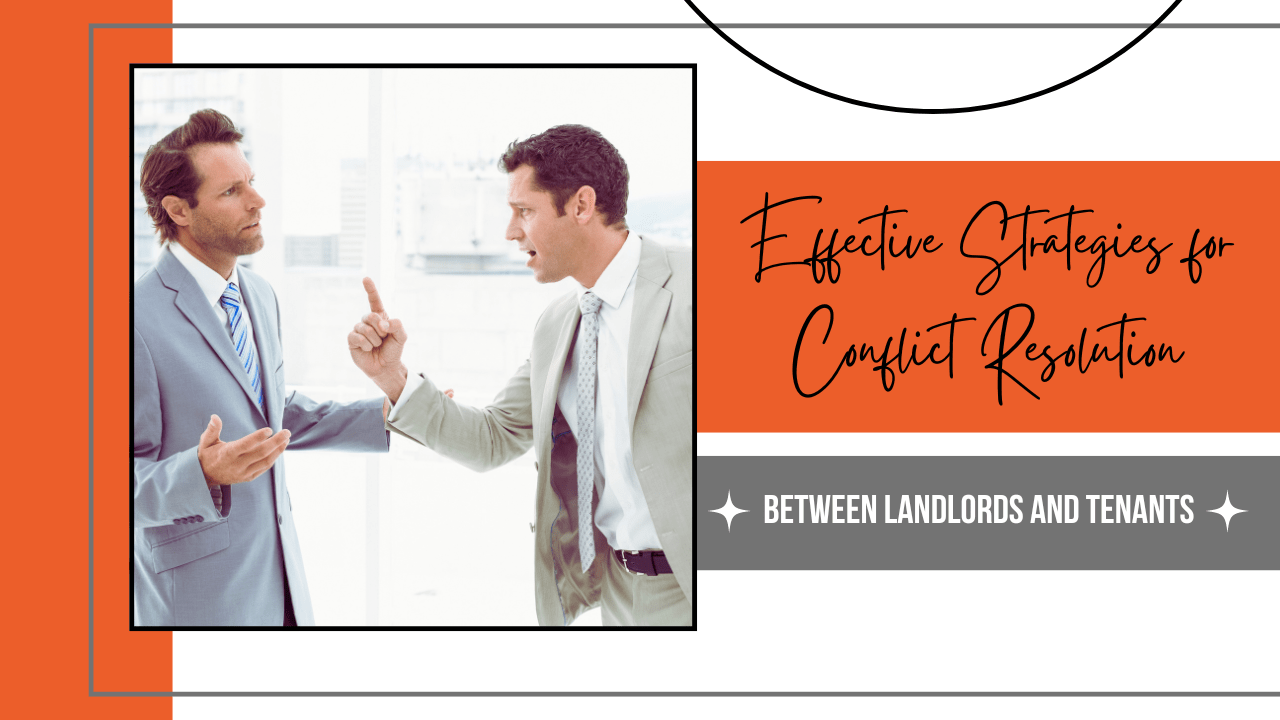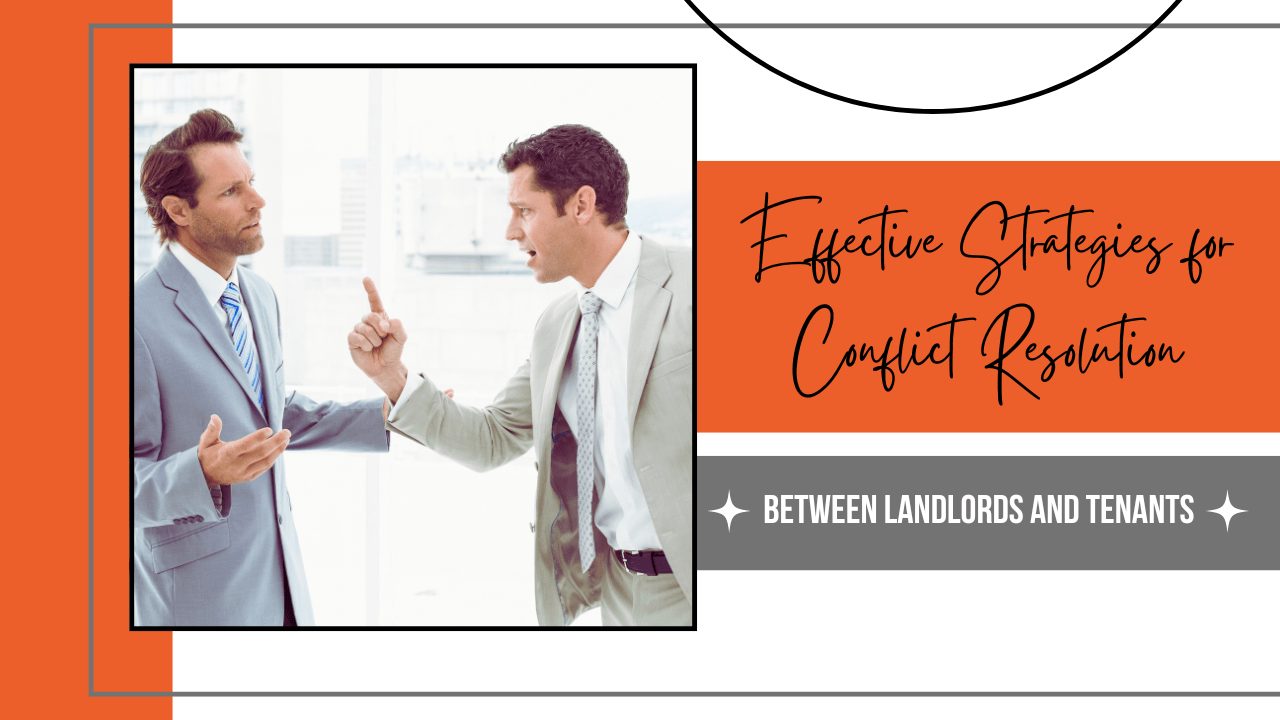
Managing properties in Atlanta isn’t always predictable, and even if you think you’ve done everything you can to establish and nurture a positive landlord/tenant relationship and provide a responsive rental experience, you can find yourself dealing with challenges and conflicts. Whether it's a dispute over rent, an impatience around maintenance issues, or a misunderstanding around the requirements in your lease agreement, finding effective ways to resolve conflicts is crucial for maintaining healthy and professional relationships. You never want the situation to escalate.
As professional property managers in Atlanta, we’ve gone around the block with tenants more than once. Today, we want to explore several strategies for conflict resolution that can help Atlanta landlords manage their properties more effectively.
Empathy and Active Listening: Skills a Landlord Needs
Empathy plays a vital role in conflict resolution between landlords and tenants. When landlords approach disputes with empathy, they will actively listen to the tenants' concerns and acknowledge their feelings.
This not only helps in de-escalating tensions but also fosters a sense of mutual respect and understanding. By putting themselves in the tenants' shoes, landlords can better understand the root causes of conflicts and work collaboratively towards finding solutions that are fair and satisfactory for both parties. You don’t have to accept blame, but you do have to be accountable for responding to the feelings of your tenants. Empathetic communication can transform adversarial relationships into cooperative ones, leading to more effective and lasting resolutions.
Active listening is more than just hearing words; it's about understanding the message, emotions, and concerns behind those words. For landlords, this skill is invaluable when it comes to avoiding conflicts and confrontations. It enhances communication. By actively listening, you create an environment where tenants feel heard and understood. This creates a sense that open communication is safe and welcome, making it easier to address issues before they escalate into disputes.
Attentive listening also builds trust. When tenants see that you genuinely care about their concerns, it leads to longer tenancies and fewer conflicts. Many disputes arise from simple misunderstandings. Active listening helps ensure that both parties are on the same page, reducing the likelihood of conflicts born from miscommunication.
Understand the Common Areas of Tenant and Landlord Conflict
Understanding where your conflicts and disputes are likely to originate can help you manage them. Typically, any problem with your tenants will start with:
Non-payment of rent. If your tenant consistently pays rent late or doesn’t pay rent at all one month and then bristles at the Pay or Quit Notice that you post on the door, it could lead to the tenant doubling down on not paying rent. There could be an eviction. You want to have a strong rent collection policy in place, complete with the consequences of not paying. There should be no surprises or outrage from your tenant when rent does not get paid and you take action.
Maintenance and repairs. If you’re not responding right away to your tenant’s repair requests, they’re going to become frustrated. There might be a disagreement about who is responsible for a specific repair. Your tenants might refuse to allow a vendor to access the property or they might complain that the problem was not fixed to their satisfaction. Resolve these conflicts with communication, by establishing expectations, and by following up. You don’t want to make your tenants wait to have the air conditioning fixed over a hot August weekend. Be responsive, even if you cannot get to the solution right away. Tenants just want to know you’re working on it.
Lease violations. Things could get tense if you notice a pet at the property that was not approved or if a significant other moves in without filling out an application or being screened. Prepare to address these issues professionally and document everything.
Clear and consistent communication is an excellent strategy for preventing and resolving conflicts. Set expectations early. When you clearly outline rules, responsibilities, and consequences in the lease agreement, tenants will have no reason to be surprised that you’re actually enforcing that lease agreement. Schedule periodic meetings or calls to discuss any concerns your tenants may have. These regulation check-ins give you the opportunity to talk with one another, potentially avoiding disputes later.
Always be approachable. Encourage tenants to voice their concerns without fear of retribution.
Tips for Long-Term Success
Achieving long-term success in managing landlord-tenant relationships involves ongoing effort and commitment, especially when it comes to managing conflicts. Here are some of the strategies that have been most effective for our team of Atlanta property management professionals.
Conduct Regular Maintenance Checks
Because this is such a common area of conflict for landlords and tenants, you want to be as preventative as possible when it comes to taking care of maintenance and repair issues. Conduct routine inspections and maintenance to address potential issues before they escalate into major problems. This shows tenants that you are invested in their well-being and the property's upkeep. Make sure you have a consistent way for tenants to report their maintenance needs. Do you accept written repair requests? This is a good way to document when the request came in and how quickly you took action. It can support you when you’re pushing back against a tenant’s claim that you did not fix something.
Create a Clear Lease Agreement
Draft well-defined and comprehensive lease agreements that outline all expectations, rules, and responsibilities. Clear documentation can prevent misunderstandings. When you can quickly reference your lease agreement during a brewing argument, you can shut that conflict down promptly. Before a tenant moves in, take the time to discuss the lease agreement in detail so there are no surprises. A lease can sometimes feel overwhelming to tenants; when you break it down and highlight the most important sections, they’ll enter the tenancy more informed.
Invest in Ongoing Education (for you and your tenants)
Stay up to date on the laws that dictate landlord and tenant relationships.
Violating a habitability law, for example, will not help you resolve a dispute about a lack of hot water. Waiting too long to return a security deposit will provide your departing tenants with a reason to file a claim or a lawsuit. Make sure you know the laws and requirements. Educate your tenants, too, especially when it comes to things like emergency preparation and preventative maintenance. This relationship has to be a partnership. When you approach the care of the property together, there’s less reason for a conflict.
Prioritize Responsive Communication
It’s simply impossible to have a good relationship with your tenants if you’ve not investing in good communication. Ensure you are easily reachable and responsive to tenant inquiries and concerns. Prompt communication builds trust and can prevent issues from festering. If a tenant is angry because they cannot get in touch with you during a maintenance emergency, they’ll have every right to complaint. Don’t give them reasons to be upset. Instead, be proactive and solution-oriented.
Incentivize Good Behavior
A great way to establish a good relationship and manage disputes is to recognize and reward tenants who maintain the property well and adhere to the lease terms. Consider implementing a rewards program or offering small gestures of appreciation. This will go a long way with your residents, and they’ll hesitate to lodge a complaint or make a fuss over small things.
By implementing these strategies, you’ll find that you can create a positive living environment that encourages long-term tenancies and minimizes conflicts.
Implementing Preventative Measures
The best way to deal with conflicts, of course, is to avoid them. Preventing these issues before they arise can save time, money, and stress. You can preserve your relationship and enjoy a pleasant and profitable rental experience. How can you limit the number of disputes and irritations that pop off between you and your Atlanta tenants? Here are a few ideas that might help:
Thorough Tenant Screening.
Conduct comprehensive background checks to ensure potential tenants have a reliable rental history. You want to do more than the courtesy credit checks. Look for any prior evictions, and always search the national eviction database. Make sure they earn enough income to avoid late or missing rental payments. Collect contact information on landlord references. A former or current landlord will tell you what it’s like to rent to that tenant, and whether conflicts and disputes were a regular occurrence.
Consistently Ask for Feedback
By giving tenants space to share their problems, suggestions, and frustrations, you can keep communication open and transparent. Be willing to hear what your tenants have to say, whether they’d like to ask for a new appliance or they’re not happy with the pest control services that you have because they keep finding ants. Create a system where tenants can share ideas with you. This will prevent conflicts and drive up tenant satisfaction, eliminating the risk of disputes that escalate to arguments.
 We’re a professional Atlanta property management company, and these are some of the ways we avoid and manage conflicts with tenants. Stay focused on communication, professional and respectful tenant relationships, and an emphasis on tenant retention. You want to provide a fantastic rental experience. It’s good for business.
We’re a professional Atlanta property management company, and these are some of the ways we avoid and manage conflicts with tenants. Stay focused on communication, professional and respectful tenant relationships, and an emphasis on tenant retention. You want to provide a fantastic rental experience. It’s good for business.
If you need some help or want to talk about this further, please contact us at Property Services of Atlanta.

 Owner Portal
Owner Portal




